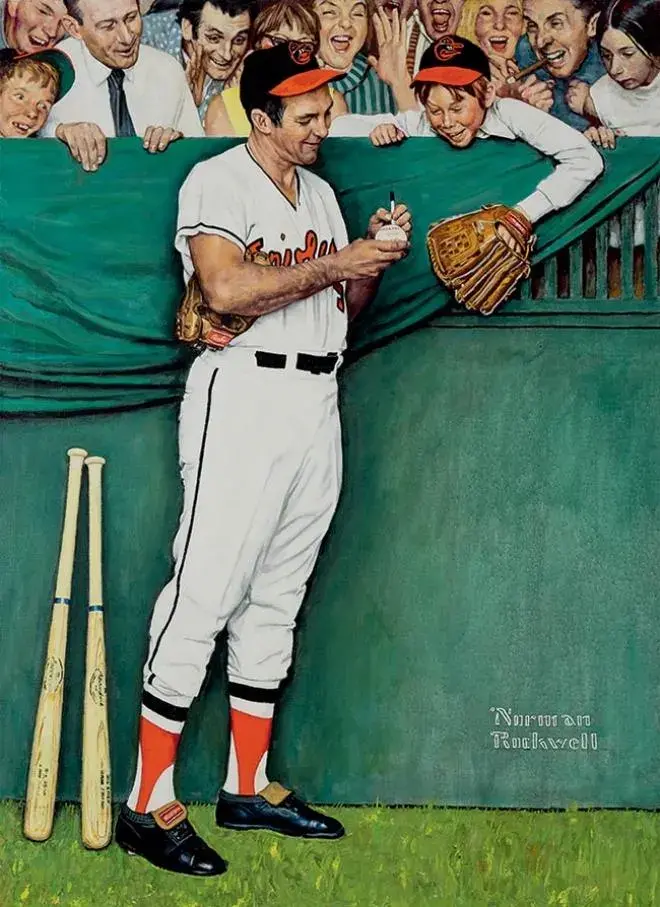What America Became When It Lost Baseball
- Charlie Teljeur

- Apr 25
- 4 min read

As American as Mom, baseball and apple pie.
This phrase became a clarion call for American soldiers during World War II, which not only provided heartfelt inspiration for those in the fight, but was also an accurate - although perhaps oversimplified - portrayal of the collective American psyche at the time. Mom was America, apple pie was America, and baseball was America.
No one really argued with that sentiment. Of all the sports America had to offer, baseball was at the very top. It was the first game the country had invented so, in the beginning, there was little to compete with.

Sports were just games back then and nothing near the national obsession they would soon become and games were just entertainment we watched when life allowed for them.
Over the next fifty years though, things would change that would forever alter the nation’s deeply-rooted connection with baseball to the point where it's been fighting to maintain relevance ever since.
While there’s no one, definitive answer as to what expedited baseball's national demise, it is obvious that the United States, as a country, has grown away from what the game represented to its people, and how its people were embodied within the national pastime itself.
Baseball has always been timeless, literally. It’s a sport not governed by any clocks, only by an historic structure that says a game will last a full nine innings, no matter how long that would take and, in the event of a tie, extra innings would be needed.
Even with the extra time added, baseball still retained its timeless quality because, by definition, it would simply last as long as it needed to. In a very deep and revelatory way, this notion mirrored life itself. Essentially, things would last as long as needed, and whatever happened would happen without the oversight of a clock.
Somewhere along the way though, the indeterminate structure of a baseball game lost its appeal. Competing against sports with definitive time frames put baseball at a disadvantage. No longer was an epic extra-inning game a cause for celebration. Instead, it simply became an impediment for the commute home which translated, ironically, to a waste of time by a society increasingly growing short of it.
Unfortunately, rather than defending baseball’s timeless appeal, the powers that be bowed to public pressure and instituted pitch clocks and other time-saving measures that would put the game more in line with its sporting competition. Americans wanted a game that could fit into a neat timeframe, and baseball's game structure just wasn’t cutting it.
The game was deliberately moving to appease an American society hell-bent on maximizing spare time which completely missed the point of what baseball had to offer: a game where time took a secondary to simple enjoyment.
In a world overwhelmed by restrictions and constraints, baseball created limitless possibilities. Baseball saw time as a matter of quality, not quantity. It was the antidote America didn’t know it even needed.
Despite baseball’s obvious appeal, the general public preferred to look elsewhere, and the main beneficiary of this tectonic shift in viewership was the National Football League. Since the early 1970s American Football has been the most popular sport to watch (for Americans) according to a succession of surveys.
Baseball had held the top spot in the national psyche for decades, but football surpassed it in 1972 and has remained dominant ever since. In a 2023 Pew survey, 53% of U.S. adults named football as their favourite sport, compared to just 27% for baseball and 9% for basketball.
So why is that? Beyond the obvious pace-of-the-game argument and the time-limited nature of every sport beyond baseball, this shift can also be attributed to a stark change in America itself. It’s a country that eschews an archaic game like baseball but fully embraces the spectacle of violence that football represents. Football is a faux war, a brute clash of gladiators attempting to dominate one another. These things speak directly to a growing phase of American society - one that embraces combat, spectacle, and violence.
This aspect of the NFL’s appeal can’t be overstated. In the dog-eat-dog world of unfettered capitalism and continual societal competition, where the zero sum game ultimately leads to a winners and losers, football checks all the boxes.
It’s mixed martial arts on a 100 yard field. America’s sporting preferences - and its overall demeanour for that matter - has transitioned from something passive to something aggressive; from contemplative to brash, and baseball's laid-back vibe just can’t compete with that.
American football is also something that America is very good at, which is fundamentally important to building a fanbase, which is not something completely unique to the United States. Nations embrace sports they’re good at, even more so when they excel at, and for America, that’s the NFL.
Compare that with baseball. American players make up roughly 75% of Major League Baseball but that advantage doesn’t translate to dominance in international competition. In the five World Baseball Classics (World Cups) held since 2006, the USA has one world championship, one second place finish, and one third place finish. During this same era, Japan has three world titles.
In contrast, American teams are undefeated in the Super Bowl, which is ridiculous given that the NFL is a closed circuit where only American teams compete but you take your dominance wherever you can find it.
So is it possible for baseball to ever regain its longstanding appeal with the American public or is this a thing that’s been lost forever? I suppose that all depends on what America, the nation and what it stands for, becomes in the future.
******



Comments